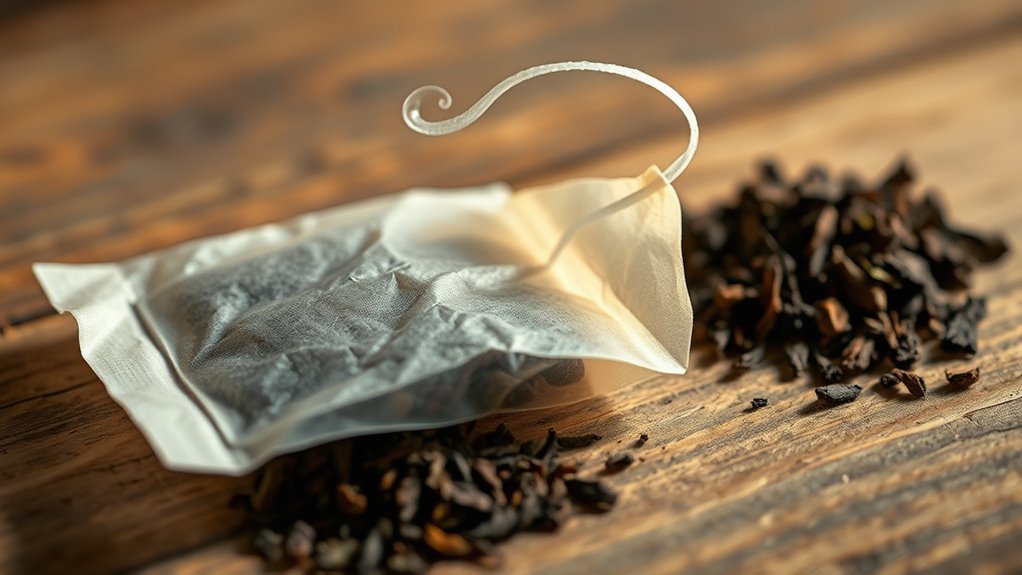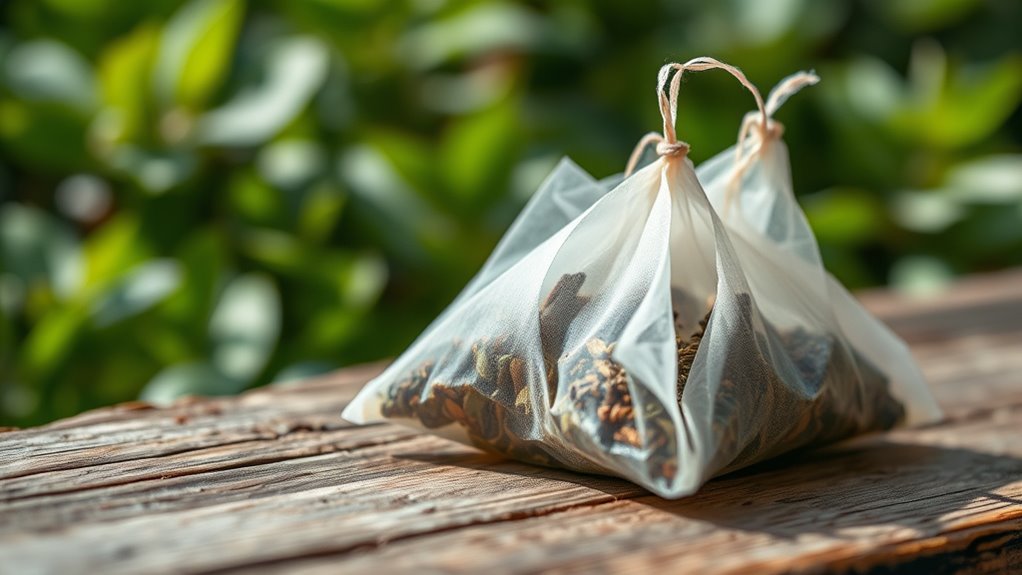Compostable tea bags are generally eco-friendly since they’re made from natural materials like paper, cornstarch, or plant-based fibers that break down faster in composting environments. They avoid synthetic coatings or adhesives, which helps guarantee their decomposition within 90 to 180 days. Proper disposal in composting facilities is essential for this process to work effectively. If you’d like to discover more about their materials and environmental impact, there’s more to uncover ahead.
Key Takeaways
- Compostable tea bags made from natural materials like paper or plant-based cellulose break down faster than conventional plastic-lined bags.
- Proper composting conditions and disposal are essential for their effective decomposition within 90 to 180 days.
- Certifications such as ASTM D6400 or EN 13432 verify that tea bags meet biodegradability standards.
- Synthetic coatings or adhesives in some bags can hinder biodegradation and may leave residues in compost.
- Using compostable tea bags in appropriate facilities reduces landfill waste and supports environmentally sustainable practices.

As more people seek sustainable options, compostable tea bags are gaining popularity as an eco-friendly alternative to traditional ones. You might wonder if they truly make a difference, especially when it comes to the materials used and how quickly they break down. Understanding tea bag materials is key to evaluating their environmental impact. Unlike conventional tea bags made from bleached paper, plastics, or synthetic fibers, compostable options are typically crafted from natural, biodegradable materials such as paper, cornstarch, or plant-based cellulose. These materials are designed to break down more efficiently in composting environments, reducing waste and pollution. It’s also important to recognize that cookie management on websites helps ensure user preferences are respected and data collection is transparent. When examining compostable tea bags, the biodegradability rates are vital. These rates determine how fast the bags decompose once discarded. Traditional tea bags can take years to break down, especially if they contain synthetic fibers or plastic linings. In contrast, compostable tea bags aim to decompose within a much shorter timeframe—often within 90 to 180 days in a proper composting setup. This accelerated breakdown means less waste ending up in landfills or polluting natural ecosystems. However, keep in mind that the actual biodegradability rate depends on factors like temperature, humidity, and whether the composting process is active or passive. You should also pay attention to certifications and labels on these products. Not all products labeled as “compostable” meet the same standards. Look for certifications such as ASTM D6400 or EN 13432, which verify that the materials are truly biodegradable and compostable within a specific timeframe. These labels give you confidence that the tea bags will break down as promised and won’t leave harmful residues behind. Furthermore, consider whether the tea bags contain any synthetic coatings or adhesives, as these can slow down biodegradation or introduce contaminants. Choosing compostable tea bags isn’t just about avoiding plastic waste. It’s about making a conscious effort to minimize your environmental footprint. When you opt for products made from natural, biodegradable materials, you’re supporting a more sustainable cycle of production and disposal. Proper composting is essential—if you toss these bags into regular trash, they won’t decompose effectively. Instead, use a home compost bin or participate in community composting programs to ensure they break down properly. In the end, compostable tea bags can be a genuinely eco-friendly choice when made from the right materials and with proper disposal. Their faster biodegradability rates and natural compositions help reduce landfill waste and lessen environmental harm. But always stay informed about product certifications and composting conditions to maximize their sustainability benefits.
Frequently Asked Questions
How Long Does It Take for Compostable Tea Bags to Decompose?
You wonder how long compostable tea bags take to decompose. Typically, the decomposition timeline depends on the tea bag materials used. Most compostable tea bags break down within 3 to 6 months in a composting environment. Factors like temperature, moisture, and compost quality influence this process. To guarantee eco-friendliness, check the materials and follow proper composting methods, allowing your tea bags to return to the earth efficiently.
Are All Compostable Tea Bags Safe for Composting at Home?
Did you know over 30% of consumers prefer eco-friendly products? Not all compostable tea bags are safe for home composting, as tea bag materials vary—some contain synthetic fibers or adhesives that don’t break down easily. Always check composting guidelines and verify your tea bags are made from natural, biodegradable materials like paper or plant-based fibers. This way, you avoid contaminating your compost and support true eco-friendly practices.
Do Compostable Tea Bags Release Any Harmful Chemicals During Decomposition?
You might wonder if compostable tea bags release harmful chemicals during decomposition. Generally, if they’re made from natural materials, they don’t undergo chemical leaching, and additive safety is high. However, some bags contain binders or additives that could leach chemicals. Always check labels to guarantee your tea bags are truly compostable and free from non-natural substances, ensuring safe decomposition and protecting your compost’s quality.
Can Compostable Tea Bags Be Used in Industrial Composting Facilities?
You’re on the right track if you wonder whether compostable tea bags can be used in industrial composting facilities. They generally meet commercial composting standards and are designed to break down during the industrial composting process. However, not all facilities accept them, so it’s best to check if your local or commercial composting providers handle these bags. It’s a case of the proof being in the pudding—ensure proper disposal for eco-friendly results.
Are There Any Brands Known for Truly Eco-Friendly Compostable Tea Bags?
You’ll want to look for brands that prioritize brand transparency and meet certification standards like BPI or OK Compost. These certifications guarantee the tea bags are truly eco-friendly and compostable in industrial facilities. Brands such as Pukka and traditional organic companies often highlight their commitment to sustainability. By choosing products with clear labeling and verified certifications, you can confidently support eco-conscious choices and reduce your environmental impact.
Conclusion
While compostable tea bags seem like a green oasis in your daily routine, remember they’re just one part of a larger garden of eco-friendly choices. Think of them as tiny seeds—potentially beneficial, but only if you nurture the entire ecosystem. By being mindful and responsible, you can help turn your tea-drinking habit into a flourishing act of environmental kindness. Every small step you take is like watering the roots of a healthier planet.










